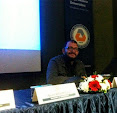INTERVIEW WITH SIMON CRITCHLEY
İbrahim Beyazoğlu
Beyazoğlu: Galatasaray fans today hold the legendary player Dževad Prekazi (who also represented the former Yugoslavia national team) in high esteem. He is best remembered for his goal against Monaco in 1989, which helped Galatasaray to reach the semi-final in the European Cup that year—the Champions League of today (https://www.youtube.com/watch?v=djh4fDLxkb0). It is often said that the the ball has a behavioural manner. It conducts itself, so to speak. Dževad Prekazi said it along these lines: if the ball does not want to go into the net, it will not; "the ball has a life. The ball does not cross the goal line if it does not want to". Sometimes, after an unlucky loss, you can hear managers and players telling the media, "the ball did not favour us today". Can we relate this to your chapter, “What is it like to be a ball?” Because in your book, What We Think About When We Think About Soccer, you state that, “Everything seems alive. Even the ball seems alive. The ball seems to animate itself and to possess an intelligence and awareness. It is a quasi-object, full of subjective investment, hovering between the animate and the inanimate”.
Simon
Critchley: Yes, it is
a remarkable goal and the ball seems to have a life of its own. So, I agree. My
point in the book is that in watching football we enter an animistic universe,
a world where things are as alive as persons. There is something archaic and
religious about all this. I see football not so much as a sport as a
devotional, religious practice. You worship Galatasaray, as you
should.
Beyazoğlu:
From time to time, in your work, you point to transformative border situations,
threshold moments. Your hilarious expression “suspenseful present” in the book
is striking. Does “suspenseful present” bear any relationship to Derridean
thinking? Can we establish a relationship between your phrase and Derrida’s
deconstructive moments, playful presence of spatiotemporality or différance?
Simon
Critchley: I don't
think so. It certainly was not on my mind. But I knew Derrida quite well and
even talked football with him, probably around the time France won the world
cup in 1998. He had been a goalkeeper in Algeria, but said he no longer watched
the game. I tried to explain the world-historical importance of his compatriot
Zidane to him.
Beyazoğlu:
In the chapter, “De-subjectifying Football”, you write that “play takes primacy
over the consciousness of play. Namely, play is not explained through
subjective intentions, brain states or biological functions, just as it is not
explained away through endless statistics and data (...). If the player is
playing well, not very much is going on in their ‘mind’ at all, and this is the
entire point: play and not the consciousness of play”. Is there any team,
school of football or player resembling or representing a football without a
subject—de-subjectified football? Maybe Brazil?
Simon
Critchley: The point
is that football takes place in what Latour calls 'the middle kingdom', between
persons and things, where both are alive. It is a question of thinking about
the lived dynamics of play, as the game is played, which is not in our heads,
but on the field of play.
Beyazoğlu: When Antonio Negri was in exile
in France, he was deprived of football. He writes that “When I was teaching at
the University of Paris-VIII, I could not discuss the situation of Olympique
Marseille or Paris Saint-Germain with anyone but the department secretary,
Helene. The other professors did not give a toss for it”. Seemingly, one of the
reasons which necessitated Negri’s return to Italy, at the expense of being
imprisoned, was Calcio. Can you relate Negri’s situation to your
experience in the US? Do you experience difficulty in talking about football in
America?
Simon
Critchley: Yes, I
completely sympathize with Negri's situation. I had to hide my deep love of
football and especially LFC for many years. I wanted to dedicate my Ph.D.
thesis to Kenny Dalglish but was advised against it. I think there has been a
significant change in the way football is talked and written about in the last
20 years and this makes me VERY happy. I can't speak for America, but I watch
nearly all my LFC games in New York and there is a really sophisticated fan
culture there. I meet LFC fans all the time. And used to buy my fruit from a
passionate Galatasaray fan. So, it is possible to talk sensibly about football
in New York. But New York is not the USA.
Beyazoğlu:
As you know, EURO 2021 is drawing near. Even though The COVID-19 pandemic has
made us change the way we relate ourselves to football, most of us are already
looking forward to watching the games. How do you see England's chance in Euro
2021? Is there any other team apart from England that you want to monitor
particularly?
Simon Critchley: I have only ambiguous feelings about the English
national team and find the behavior of England fans reactionary and
embarrassing. Liverpool is in England, but not OF England, which is why we
think of LFC as international, European royalty and so on. I will watch the
Euros closely. I am curious to see how far Turkey will go. I hope they go far.
My feeling is that France will win. As they have the best players. I don't
really care about England.




Hiç yorum yok:
Yorum Gönder